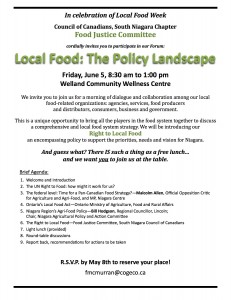 Council of Canadians, South Niagara Chapter
Council of Canadians, South Niagara Chapter
Food Justice Committee presents…
Local Food: The Policy Landscape
June 5, 8:30 am to 1:oo pm
Welland Community Wellness Centre
R.S.V.P. by contacting fmcmurran@cogeco.ca to reserve your place!
Who we are and why we’ve called this Forum…
The Council of Canadians is Canada’s oldest independent national citizens’ organization. Established in 1985, the Council of Canadians is funded neither by government nor by corporations, but by members and supports across the country. The foundation of our work is the education and empowerment of people to fight for the values and policies we believe in. Our members, supporters and network of over seventy activist chapters create a powerful voice for social and environmental justice. We work to hold governments accountable and to challenge the unbalanced power of large corporations, and to promote positive social change in Canada and the world.
The South Niagara Chapter of the Council of Canadians was formed in January 2009. In the fall of 2013, it attracted a number of new members from various parts of Niagara, all of whom were interested in working on issues of Food Justice. We have been pooling our experience and knowledge of the many questions surrounding food and agriculture and doing our best to learn more, through meetings and webinars on local food distribution issues, learning about new research on agriculture, land us policies, water and environmental conservation, and related issues, as well as attending workshops and meetings here and in Toronto and Hamilton on food insecurity and problems with food distribution. We are passionately committed to the local food movement, and to seeing Niagara become a centre for sustainable food production.
The Food Justice Committee presented a Resolution on the Right to Local Food to the Annual General Meeting of the Council of Canadians on October 5, 2014, where it was unanimously adopted.
Agenda
A. Introduction. Our Food Justice Committee and our proposed Right to Local Food. Why we’ve called this forum:
- to introduce our proposed “Right to Local Food”
- to present new approaches to food and agricultural policy
- to bring together Niagara’s “food” community and the “farm” community to investigate ways to implement the Local Food Act that improve our local agriculture-based economy while addressing food insecurity
B. Brief summary of the Final Report by the UN Special Rapporteur on the Right to Food, with a particular focus on the Addendum. Mission to Canada, noting that Canada has been shamed by the public focus on the food insecurity in various parts of the country, notably on First Nations reserves and in the Far North. 9.9% of Niagara’s population is food insecure. How is this possible? How can we address the problem?
C. Federal. Opposition Agriculture and Agric-Food Critic, Malcolm Allen (MP, Niagara Centre): A Pan-Canadian Food Strategy. (This strategy links food and agriculture).
D. Provincial. Ontario Ministry of Agriculture, Food and Rural Affairs (TBA): Ontario’s Local Food Act. Rationale and progress to date.
E. Regional. Bill Hodgson, Regional Councillor, Lincoln; Chair, NAPA: Niagara strategies to implement the Local Food Act.
F. South Niagara Council of Canadians, Food Justice Committee: the Right to Local Food.
BREAK. Light lunch that participants bring back to their tables (organized by sector, i.e. food growers, food distributors, public health, education, institutions/residences, anti-poverty groups/agencies)
G. Round Table discussions. To discuss and respond to two questions:
- Would a Right to Local Food help with your work? How?
- What measures would help to advance the Right to Local Food concept in your sector?
H. Wrap-up and next steps



